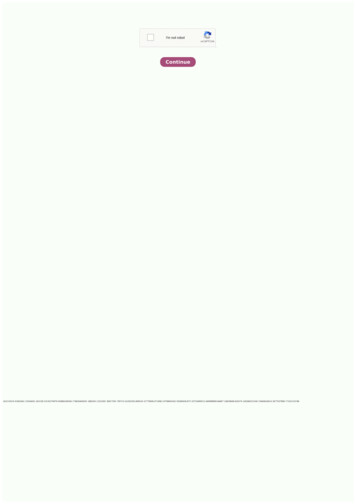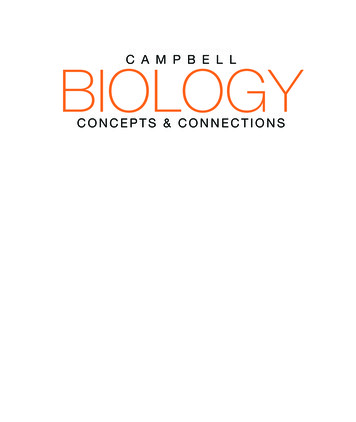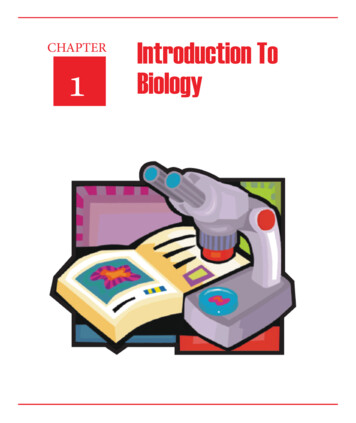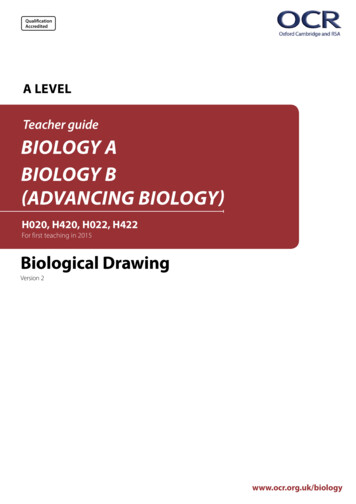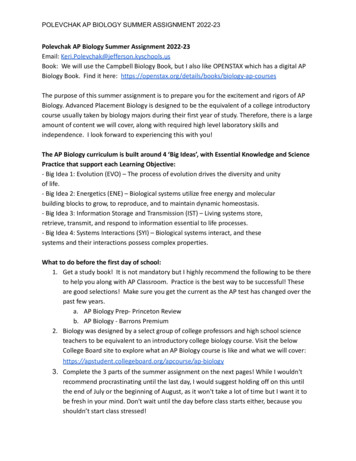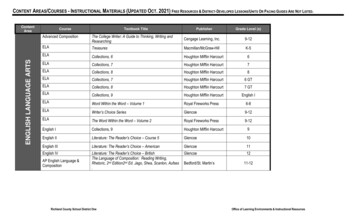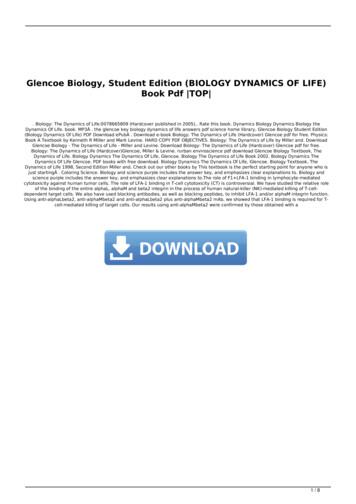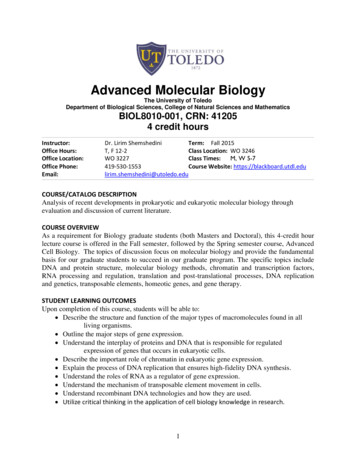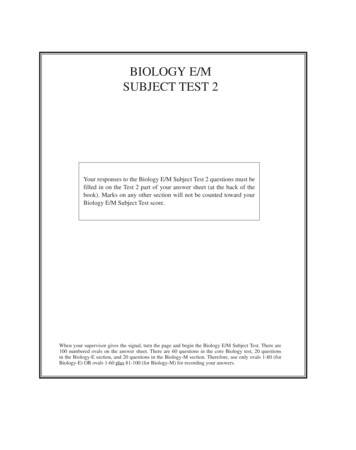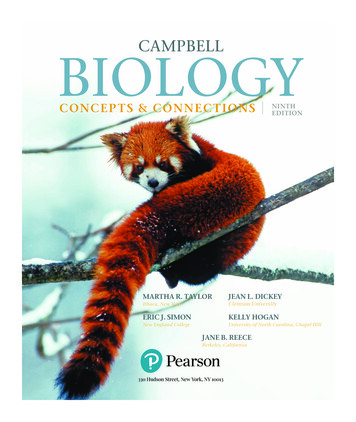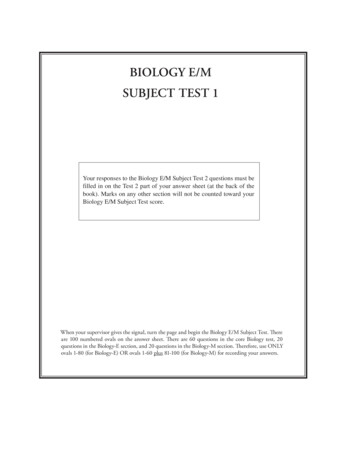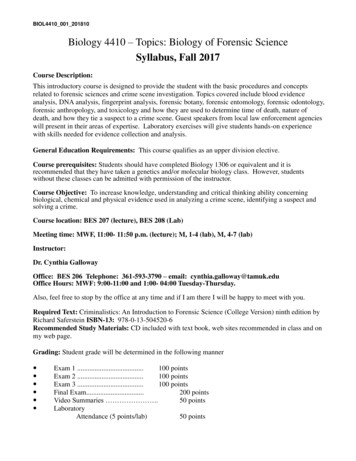
Transcription
BIOL4410 001 201810Biology 4410 – Topics: Biology of Forensic ScienceSyllabus, Fall 2017Course Description:This introductory course is designed to provide the student with the basic procedures and conceptsrelated to forensic sciences and crime scene investigation. Topics covered include blood evidenceanalysis, DNA analysis, fingerprint analysis, forensic botany, forensic entomology, forensic odontology,forensic anthropology, and toxicology and how they are used to determine time of death, nature ofdeath, and how they tie a suspect to a crime scene. Guest speakers from local law enforcement agencieswill present in their areas of expertise. Laboratory exercises will give students hands-on experiencewith skills needed for evidence collection and analysis.General Education Requirements: This course qualifies as an upper division elective.Course prerequisites: Students should have completed Biology 1306 or equivalent and it isrecommended that they have taken a genetics and/or molecular biology class. However, studentswithout these classes can be admitted with permission of the instructor.Course Objective: To increase knowledge, understanding and critical thinking ability concerningbiological, chemical and physical evidence used in analyzing a crime scene, identifying a suspect andsolving a crime.Course location: BES 207 (lecture), BES 208 (Lab)Meeting time: MWF, 11:00- 11:50 p.m. (lecture); M, 1-4 (lab), M, 4-7 (lab)Instructor:Dr. Cynthia GallowayOffice: BES 206 Telephone: 361-593-3790 – email: cynthia.galloway@tamuk.eduOffice Hours: MWF: 9:00-11:00 and 1:00- 04:00 Tuesday-Thursday.Also, feel free to stop by the office at any time and if I am there I will be happy to meet with you.Required Text: Criminalistics: An Introduction to Forensic Science (College Version) ninth edition byRichard Saferstein ISBN-13: 978-0-13-504520-6Recommended Study Materials: CD included with text book, web sites recommended in class and onmy web page.Grading: Student grade will be determined in the following manner Exam 1 .100 pointsExam 2 .100 pointsExam 3 .100 pointsFinal Exam.200 pointsVideo Summaries .50 pointsLaboratoryAttendance (5 points/lab)50 points
BIOL4410 001 201810Lab exercises (10@10 pts ea.) Total100 points700 pointsPlease keep all tests and assignments, in case there is a question concerning the assigned grade in thecourse. Grades will be awarded as follows:90-100% A, 80-89% B, 70-79% C, 60-69% D, and less than 60% FThe last day to drop the course with an automatic grade of Q is November 01stSenate Bill 1231, passed by the Texas legislature 2007, limits the number of drops (six) thatundergraduate students may accrue without a punitive grade. Undergraduates completing a highschool program and enrolling in an institution of higher education prior to fall 2007 are exempt.Undergraduate students completing a high school program and enrolling in an institution ofhigher education for the first time or after fall semester 2007 are subject to the law. (See Catalog,pp.57 ).All discussion of grades will be handled in person and not over the phone or via e-mail. If you wish toknow your final exam grade you may leave me a self-addressed stamped envelope prior to the end ofthe semester. Your final course grade may be seen on the Blue and Gold Connection by the Mondayfollowing graduation date of exercises.For all exams given in this class you must bring a 100 question Scantron form and a number two pencil.Both may be obtained from the University bookstore but a number two pencil from anywhere isacceptable. Be sure to have your Scantron and pencil at the start of class because once the test isstarted you will not be allowed to leave the room except in cases of emergency.Test day protocolOn the days of the exams you are expected to be in the class at 11:00 a.m. and under no circumstanceswill you be allowed to start the test if it is after 11:15 a.m. or someone has already completed the testand turned it in. You are expected to remain in class after the test has been distributed until you havecompleted the test and turned it in. This means go to the bathroom, get a drink, sharpen your pencil,and bring Kleenex so you will not have to leave the class. No hats will be allowed to be worn duringthe exam and absolutely no cell phones will be allowed on. You may be required to surrender your cellphones to me prior to the exam and pick it up when you turn in your exam. All books, papers, andpersonal possessions (with the exception of purses) will be placed in the front of the room in BES 209during the exam. You will also make sure that there is one empty seat between you and the people youare sitting next to. If you have questions during the test ask me, NOT THE PERSON SITTING NEXTTO YOU. If you will not be able to conform to these requirements, please come talk to me about yoursituation.Reading Assignments/Homework: Reading assignments will be announced in class and, it is stronglyrecommended that you read the chapter being discussed in class prior to coming to class. The chapterscovered are listed in column 2 of the schedule included in this syllabus.Lecture Exams: The THREE lecture exams will cover material presented since the previous test andwill consist of multiple-choice and short answer questions. The midterm covers information from the
BIOL4410 001 201810first half of the class and the final will cover all material presented since the start of the semester givingyou the opportunity to synthesize various topics covered during the semester. Midterm and final examswill be mainly essay, short answer and definition questions.You are responsible for all the material presented in class and in the chapters accompanying thelectures.You may sometimes have more than one exam scheduled during the same week or even on the sameday. It will be up to you to manage your time properly to deal with such situations. Our schedule inthis course is too tight to modify it to accommodate another class. If you feel you have a problem inthis area, please see me WELL BEFORE the exam.Lectures: The lectures will often cover material in addition to what is contained in the text, and willassume that you have completed any reading assignments. The notes for this class that can be found onmy webpage and on blackboard are not all inclusive of what will be presented in class. Just reading thenotes from my webpage and on blackboard will not guarantee you'll have all the material necessary topass the class. In other words, COME TO CLASS!Web Notes: You may be provided with lecture outlines prior to each chapter. These can bedownloaded from blackboard and are designed to assist you in note-taking during lecture. They areNOT intended to be all inclusive.Make-up Policy: There will be NO automatic make-ups for unexcused missed exams. In the case ofcrises and emergencies (that you can document and that are considered a valid excuse by me), talk tome (or phone me) BEFORE the exam and more flexible arrangements may be scheduled. (Under thoseconditions the exam may be unique, and may be more difficult).Classroom Decorum: Cell phones must be turned off during class. NO TEXT MESSAGING!!! DoNOT carry on personal conversations once lecture has started. Repeated offences will result in youbeing removed from the lecture.Other: There is no policy of required attendance. However, it is unlikely that you will earn anacceptable grade if you do not attend class regularly. Attendance may be recorded for each lecture andwill be considered in your final grade, especially in borderline cases. Attendance alone does notguarantee a passing grade. It is important that you take complete and comprehensive notes of thelecture material. It is also essential that you study regularly.I reserve the right to drop a student for regular non-attendance or for regularly failing to turn inassignments or take exams. Regular attendance in both, lecture and lab, plus active class participationcan result in a higher course grade in the case of borderline situations.The university offers special workshops for students who need to improve their note taking and studyskills.Disability Statement: Students with disabilities, including learning disabilities, who wish to requestaccommodations in class, should register with the Services for Students with Disabilities (SSD) early inthe semester so that appropriate arrangements may be made. In accordance with federal laws, a studentrequesting special accommodations must provide documentation of their disability to the SSDcoordinator.
BIOL4410 001 201810Academic misconduct statement: You are expected to practice academic honesty in every aspect ofthis course and all other courses. Make sure you are familiar with your Student Handbook, especiallythe section on academic misconduct. Students who engage in academic misconduct are subject touniversity disciplinary procedures. Forms of academic dishonesty:1) Cheating: deception in which a student misrepresents that he/she has mastered information on anacademic exercise that he/she has not mastered; giving or receiving aid unauthorized by the instructoron assignments or examinations.2) Academic misconduct: tampering with grades or taking part in obtaining or distributing any part of ascheduled test.3) Fabrication: use of invented information or falsified research.4) Plagiarism: unacknowledged quotation and/or paraphrase of someone else’s words, ideas, or data asone’s own in work submitted for credit. Failure to identify information or essays from the Internet andsubmitting them as one’s own work also constitutes plagiarism!Any student found to be guilty of any forms of academic misconduct will be subject to receiving eithera zero on the assignment, an F for the course or dismissal from the University. YOU HAVE BEENWARNED!!!!!Classroom Conduct ExpectationsTexas A&M University-Kingsville students are expected to assume individual responsibility formaintaining a productive learning environment and conduct themselves with the highest regard forrespect and consideration of others. Ongoing behaviors or single behaviors considered distracting(e.g., coming late to class, performing a repetitive act that is annoying, sleeping or reading anewspaper in class, etc.) can be addressed by the faculty member initially either generally orindividually as part of the instructor’s classroom management efforts. Cases in which such annoyingbehavior becomes excessive and the student refuses to respond to the faculty member’s efforts canbe referred to the Dean of Students.In the case of serious disruptive behavior in a classroom (making loud and distracting noises,repeatedly answering cell phones/text messaging or allowing pagers to beep or play ring tones,exhibiting erratic or irrational behavior, persisting in speaking without being recognized, repeatedlyleaving and entering the classroom or test site without authorization, throwing things, blocking anentry way, using profane, intimidating or abusive language and/or repeatedly interrupting others’speech, etc.) the instructor should first request compliance from the student and if the student fails tocomply, an instructor has the authority to ask the student to leave the classroom. The student isexpected to comply with this request to leave the classroom and may subsequently contest thisaction using procedures established by the department. If the student fails to leave after beingdirected to do so, assistance may be obtained from other university personnel including theUniversity Police Department. The incident shall be handled as an academic misconduct matterusing established departmental procedures for academic misconduct to determine if the studentshould be allowed to return to the classroom.THERE WILL BE NO DRINKING, EATING, OR E-CIGARETTE USE IN THE LECTUREROOM.Sexual misconduct: Sexual harassment of students and employers at Texas A&MUniversity-Kingsville is unacceptable and will not be tolerated. Any member of the universitycommunity violating this policy will be subject to disciplinary action.
BIOL4410 001 201810Tentative ScheduleWeek ofLecture TopicAug. 23Aug. 1822Sept. 25 –Sept. 29Oct.Oct.Oct.Oct.Oct.Oct.2691316 20Oct. 23 –Oct. 27Oct. 30 Nov. 3Nov. 6 Nov. 10Nov. 13Nov. 17Introduction to the courseDefinition and scope of forensic science History anddevelopment of forensic scienceThe Crime SceneVideoLabor Day Holiday (9/4) – No ClassPhysical evidenceCollecting physical evidenceFingerprintsReadingAssignmentChapter 1Chapter 2Chapter 3Chapter 6FingerprintsChapter 6Exam 1MicroscopeHairs, Fibers,& PaintChapters 7, 8Forensic Analysis of GlassChapter 9ToxicologyChapter 12DrugsChapter 11Exam 2November 01: Last day to drop with a QDNAChapter 15DNAChapter 15Case StudiesNov. 20Exam 3Nov. 23-24 Thanksgiving Holiday-no classesNov. 27 –Dec. 1Catch up and ReviewDec. 4 –Dec. 6Dec. 7Dead weekDec. 138 AMFinal ExaminationStudy Day – No Classes
Biology 4410 - Topics: Biology of Forensic Science Syllabus, Fall 2017 Course Description: This introductory course is designed to provide the student with the basic procedures and concepts related to forensic sciences and crime scene investigation. Topics covered include blood evidence
